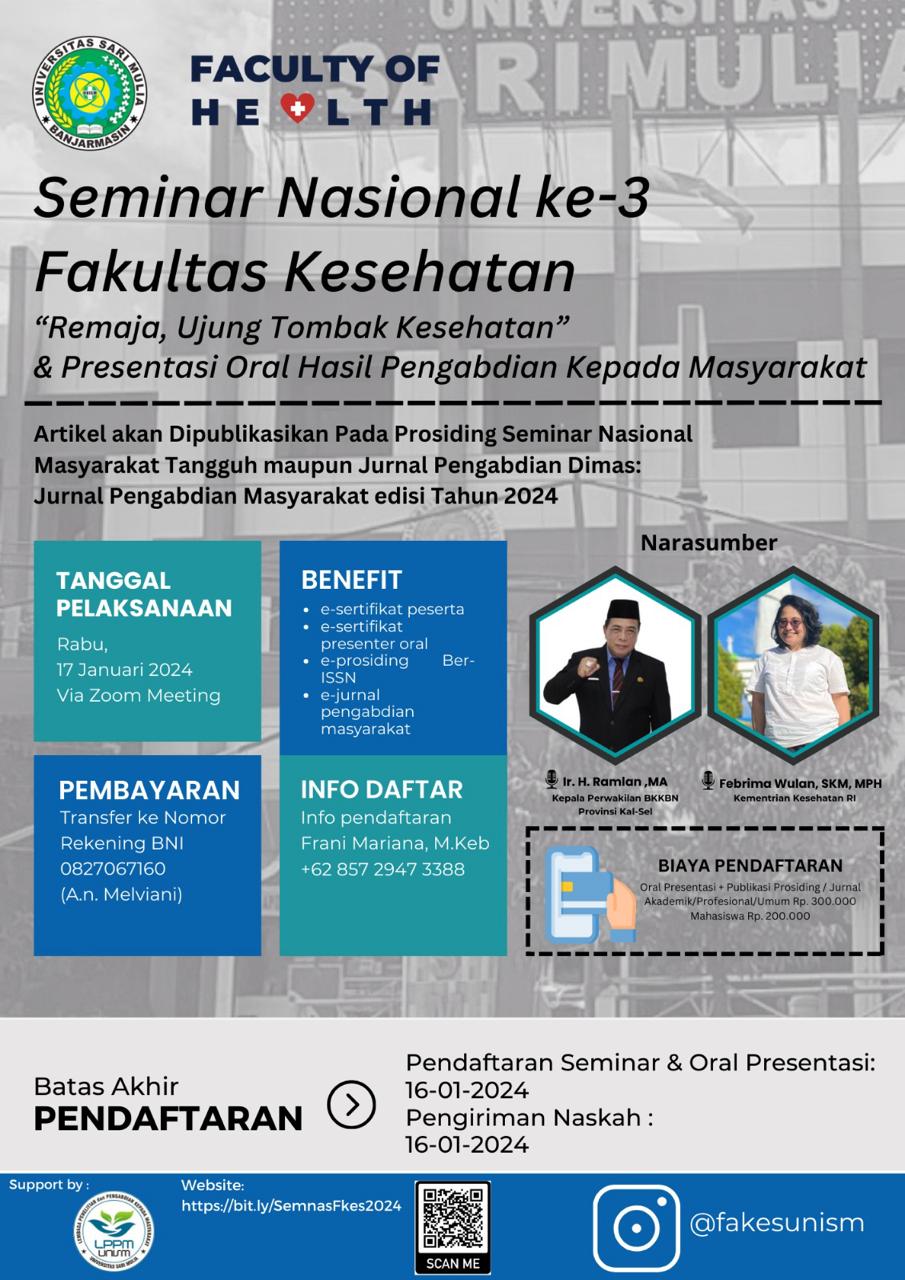F "GAS MANJA"Father's Movement to Monitor Mother and Fetus
Keywords:
mentoring, husband, pregnancy visitsAbstract
Antenatal Care (ANC) is a pregnancy examination which aims to improve the physical and mental health of pregnant women optimally, so that they are able to face the period of childbirth, postpartum, exclusive breastfeeding, and return to reproductive health as before pregnancy. In the South Kalimantan Health Service Profile in 2020, the number of antenatal care visits decreased from K1 to K4 by 3.18%, then in 2021 there was an increase in K1 (7.54%) and K4 (5.61%). Meanwhile, according to data from the North Hulu Sungai health service, the projected achievement for K1 is 72.73% and K4 is 66.33%. Based on the Indonesian Ministry of Health 2019, the factors that influence ANC visits are internal factors (parity, age) and external factors (knowledge, attitudes, culture and husband's support). Based on the results of problem analysis at the Babirik Health Center UPT in the working area of Sungai Durait Hulu Village, Babirik District, Hulu Sungai Utara district, in December 2023 there were 8 pregnant women. Of the 8 people, only 1 pregnant woman received assistance from her husband, 7 other pregnant women were without assistance for various reasons. In this case, there is a need for information and support in the form of education "GAS MANJA' (Father Monitoring Mother and Fetus Movement)" which is designed as a service effort to provide knowledge and understanding to husbands about the importance of participating in monitoring the mother and fetus so that husbands know the schedule. examination of pregnant women and providing assistance during pregnancy. The educational method used is cooperative learning using the KIA Book and a key chain containing the visit schedule. The results of the activity show an increase in husbands' knowledge of the importance of participating in maternal and fetal monitoring so that husbands know the schedule for examinations of pregnant women and provide assistance during pregnancy. As a result of the evaluation, they felt helped by this activity and hope that activities like this will continue
References
Danianto, A., Jumsa, R., Geriputri, N. N., Andari, M. Y., & Others. (2022). Gambaran Epidemiologi Faktor Risiko Preeklamsia Pada Ibu Hamil. Jurnal Kedokteran, 11(1), 785–788.
Https://Kesmas.Kemkes.Go.Id/Konten/133/0/Turunkan-Angka-Kematian-Ibu-Melalui-Deteksi-Dini-Dengan-Pemenuhan-Usg-Di-Puskesmas. (2020)
Mulyanti, L., Mudrikatun, & Sawitry. (2020). Hubungan Dukungan Suami Pada Ibu Hamil Dengan Kunjungan Anc Di Rumah Bersalin Bhakti Ibihubungan Dukungan Suami Pada Ibu Hamil Dengan Kunjungan Anc Di Rumah Bersalin Bhakti Ibi Kota Semarang. Jurnal Unimus, 44, 27–32. Http://Download.Portalgaruda.Org/Article.Php?Article=98416&Val=422.
Murniati, Nyorong, M., & Begum Suroyo, R. (2022). Faktor Yang Memengaruhi Suami Siaga Pada Masa Kehamilan Di Poskesdes Keude Aceh Kecamatan Banda Sakti Kota Lhokseumawe. Journal Of Healtcare Technology And Medicine, 8(2), 2615–109
Notoatmodjo, S. (2016). Ilmu Perilaku Ksehatan (cetakan 4.). Rineka Cipta.
RI, Kementrian Kesehatan. (2023). Buku Kesehatan Ibu Dan Anak. Kementrian Kesehatan RI.
Safitri, Y., & Lubis, D. H. (2020). Dukungan Suami, Pengetahuan, Dan Sikap Ibu Hamil Terhadap Kunjungan Antenatal Care. Jurnal Kebidanan Malahayati, 6(4), 413–420. Https://Doi.Org/10.33024/Jkm.v6i4.3042
Sarwono Prawirohardjo. (2020). Ilmu Kebidanan (T. Printer (Ed.)). Pt Bina Pustaka Sarwono Prawirohardjo Jakarta.



